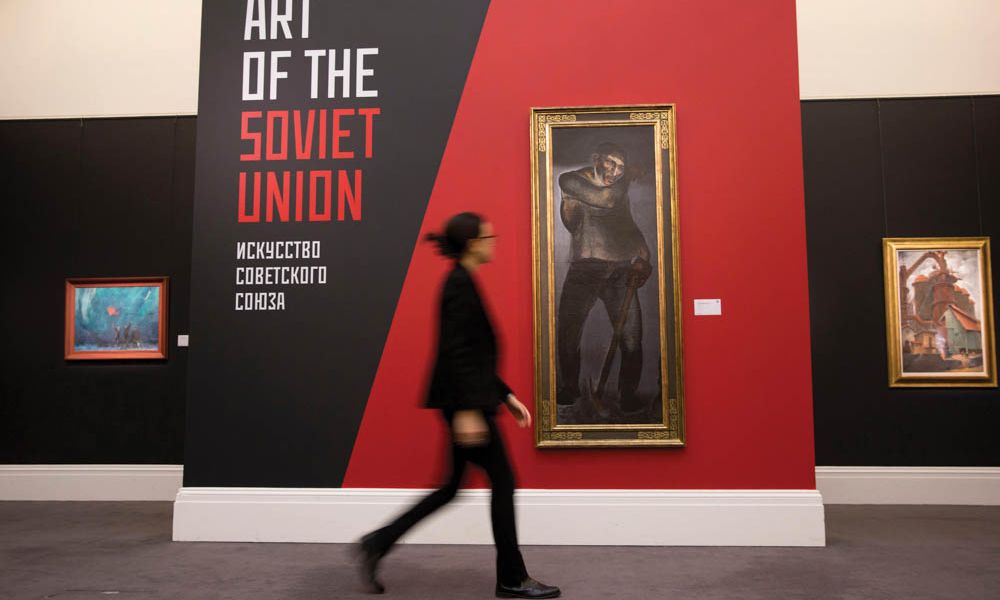Sotheby’s 2017 Art of the Soviet Union show commemorated the centenary of the Russian Revolution. The auction house’s move to ban buyers in Russia from participating in sales is likely to be adopted by others. © PA Images/Alamy Stock Photo
Sotheby’s has banned some Russian buyers from participating in sales, The Art Newspaper understands, as the art market deliberates the strength of its response to the escalating situation in Ukraine. Reliable sources close to the auction house confirmed that transactions were no longer being accepted from buyers in the country or from Russian citizens whose main income still derives from the country, although details as to how this is being verified are unclear.
Meanwhile, the German auction house Ketterer Kunst has stopped doing business with all clients in Russia. “In the face of the dramatic events, we can‘t just stand inactively on the sideline," says the firm's auctioneer and owner, Robert Ketterer. "War crimes that call for urgent response are being committed in our European neighborhood." He adds: "In order to take a stand against the war, we also decided to stop doing business with Russia altogether."
The ban comes as the art market navigates its way through a fluid situation of changing sanctions on Russian individuals and companies, alongside growing consciousness of the sector’s obligations under relatively new anti-money laundering (AML) regulations.
“There is heightened concern from clients,” says Rakhi Talwar, formerly of Christie’s compliance team and founder of RTalwar Compliance. “Now, more than ever, they need to be alive to the risks of sanctioned persons and entities circumventing asset freezes by using intermediaries and complex structures to obscure their involvement in transactions.”
While sanctions have not yet directly called on the market to cease all trade with Russia, the UK and G7 leaders banned exports of art and antiques to the country in mid-March, and companies and dealers are reviewing their own levels of response.
A spokesperson for Sotheby’s says: “[We have] a small administrative office in Moscow, which is currently closed, and we are rigorously following the present sanctions and complying with any regulations put in place, while monitoring closely as the lists are updated.”
Meanwhile, Christie’s says its “global anti-money laundering and sanctions compliance programmes” had immediately taken effect to ban “individuals or companies who are designated on applicable sanctions lists to transact with us”, including private sales. In an extra step, it said that “politically exposed persons, and those with a connection to a sanctioned or other high-risk jurisdictions, are also subject to enhanced due diligence.”
Guiding principles
“I tell my clients to ask themselves three questions as they approach transactions in this climate,” says Rena Neville, the founder and director of Corinth Consulting. “Unless the answer to all three is a solid yes, they should not proceed. Question one: is it legal to engage with this person on this matter? Question two: is it ethical to do so? Question three: would you be comfortable if this involvement became public?”
However, it seems likely others will follow the lead of Sotheby’s and Ketterer Kunst. Indeed, a report last month in the Antiques Trade Gazette suggests that some regional auction houses have similarly stopped taking bids from Russian buyers, while Tom Noon, of the due diligence platform Arcarta, confirms that a large number of galleries with an international footprint (such as in the US) “are adopting a position of checking all unknown enquirers for sanctions at the point at which an enquiry is made”.
Determining the benefactor or origin of funds is more complex than simply determining the address of a client. Where there is a lack of clarity, advice is also erring towards caution. “Knowing the source of funds and ultimate beneficial ownership are now of paramount importance,” says Georges Lederman, a special counsel in the white-collar defence team at Withers. “In the absence of clear evidence that the source of funds is liscit and the ultimate beneficial owner is neither on a sanctions list nor in any way affiliated with the Specially Designated National, one should consider not entering into an art sale transaction.”
Even when a decision is made to cease or to not enter a transaction with a party, there remains uncertainty and a lack of precedent as to how best to handle such difficult conversations.
Given that the sector is also relatively new to AML regulations in general, there is also an added layer of complexity in navigating how processes apply to such a fluid situation. The knowledge that the UK’s HMRC will begin its planned checks on the art market and its adoption of the legislation over the next few months adds another layer of pressure.
Trade organisations have been active in liaising with members on issues but recognise that more guidance could be helpful. “It would be good to know what the next steps in this rapidly changing situation might be,” says Freya Simms, the chief executive of LAPADA, the association of art and antiques dealers. “However, it is apparent that decisions are changing daily, and it is hard for the DCMS [culture department] and HMRC to get the information out quicker than they are already doing.”

